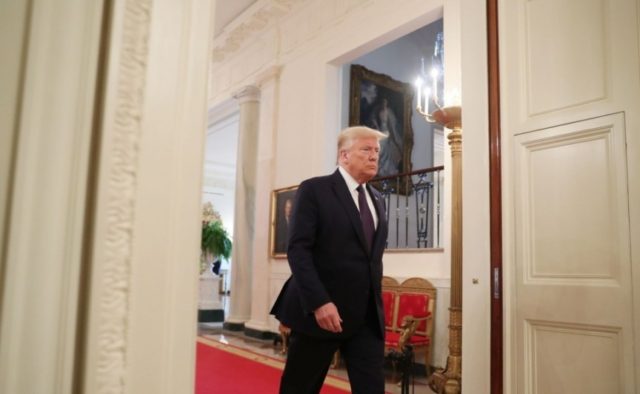June 17 (UPI) — U.S. President Donald Trump on Wednesday signed a bill into law to punish China over its treatment of its Uyghur citizens on the same day his former national security advisor claimed Trump told Chinese President Xi Jinping that he supported their internment camps where some 1 million of the Muslim-minority population have been detained.
The Uyghur Human Rights Policy Act of 2020 overwhelmingly passed both the House and Senate calling for the president to report to Congress within 180 days a list of individuals and entities responsible for human rights violations committed against the Uyghur people in China’s autonomous Xinjiang region for the purpose of sanctioning.
“The act holds accountable perpetrators of human rights violations and abuses, such as the systematic use of indoctrination camps, forced labor and intrusive surveillance to eradicate the ethnic identity and religious beliefs of Uyghurs and other minorities in China,” Trump said in a statement after he signed the bill into law.
Trump notes that the law permits him to withhold imposing sanctions if he determines it is in the best interest of the nation.
“My administration will make appropriate efforts to comply with section 6(g) of the act by notifying the relevant congressional committees before terminating sanctions with respect to a person under the act, but it will not treat the provision’s requirement for advance notice as binding to the extent that it interferes with the president’s conduct of diplomacy,” Trump said.
Both the United Nations and the U.S. State Department have published reports stating a million Uyghur and other Muslim minorities have been detained in concentration camps in the northwestern territory under the pretext of countering terrorism and religious extremism.
A State Department report details the human rights abuses by China against this population include unlawful killings, forced disappearances, torture, arbitrary detention and severe restrictions on religious freedoms, among a long list of other such crimes.
The issue of human rights in Xinjiang has been an aggravating issue for U.S. politicians on both sides of the aisle.
However, the same day Trump signed the bill into law an excerpt of a book authored by his former national security adviser, John Bolton, states the president defended China’s construction of camps to detain Uyghur Muslims.
“According to our interpreter, Trump said that Xi should go ahead with building the camps, which Trump thought was exactly the thing to do,” Bolton wrote. “The National Security Council’s top Asia staffer, Matthew Pottinger, told me that Trump said something very similar during his November 2017 trip to China.”
The bill’s signing is expected to further heighten tensions between the two countries that have seen their relationship further fray recently over human rights concerns in the Asian nation and accusations from Washington over Beijing’s response to the coronavirus.
China has repeatedly responded with indignation against allegations of human rights abuses committed against its Uyghur citizens and has threatened retaliation if the bill passes.
“We urge the U.S. to correct its mistakes at once, prevent this bill from becoming law and stop using Xinjiang-related issues to interfere [with] China’s internal affairs. China will take further reactions according to how the situation develops,” Foreign Ministry spokeswoman Hua Chunying said late last year after an earlier version of the bill passed the House of Representatives.

COMMENTS
Please let us know if you're having issues with commenting.